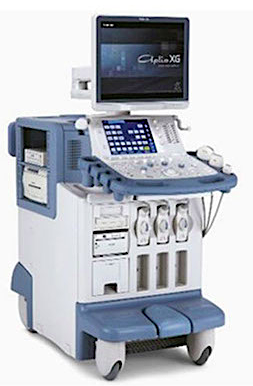A national scoop for ultra remote town
16 September 2020
 By ERWIN CHLANDA
By ERWIN CHLANDA
Its extreme remoteness – four hours north-east of Alice Springs – hasn’t stopped Ampilatwatja, population 500, from plugging into a national initiative that will deliver to it, by Tuesday, a hospital standard ultrasound equipment.
It’s a long story which started with a mix-up in a Queensland medical centre which finished up with two instead of one of these machines, the second one collecting dust for a couple of years.
This came to the notice of Wayne Leathem, a member of the Sydney Cove and later of the Currumbin Coolangatta Tweed Rotary Clubs, who formed the Medical Repurposing Network for medical equipment which is no longer required by their owners, but in good nick.
The Toshiba XG 500 machine (pictured), about the size of a fridge, worth $200,000, would be adequate for a regional hospital.
Rachael Ashley-Butler, the clinic manager of the Ampilatwatja Health Centre, became aware of a national circular sent around by Mr Leathem, targeting larger medical facilities.
She put the clinic’s name down, without much hope.
Luckily for Ampilatwatja “no-one [else] took them up on the offer,” says Mrs Ashley-Butler, and now, with the help of Rotary members in Alice Springs and Tweed Heads, and Samford Men’s Shed it is on its way.
The Registered Nurse and clinical manager of the clinic with five nursing staff says the advantages of having the machine will be significant.
All nursing staff will be trained to operate it, with the help of the Australasian Society of Ultrasound in Medicine, massively reducing the need for people in the area to go to Alice Springs or Tennant Creek for check-ups.
Most of that training will be online.
“The Ampilatwatja Health Centre Board, and all its staff, are very excited to be able to offer services in a remote setting that has been made available through generous donations,” says Mrs Ashley-Butler.
“And the programme has a potential to be shared with the Alyawarr Nation clinics including Urapuntja clinic, Ali Curung and the outstations they serve.
This is what it will do:-
- Provide up to three check-ups for expecting women to determine when the baby is due and if she or he has any medical problems which would show up in morphology, looking at the shape of the baby.
- Check for deep vein thrombosis.
- Free fluid assessment (internal bleeding such as after a car or cattle work accident).
- Kidney stones.
- Liver and bladder health.
- Blood vessel damage.
- Finding hidden veins for taking blood – and more.


